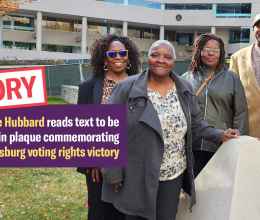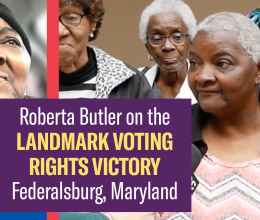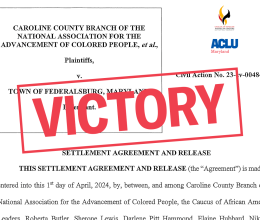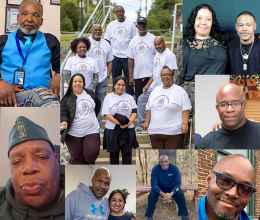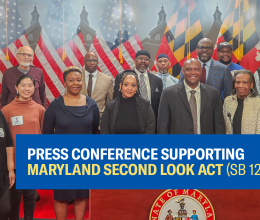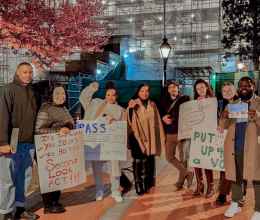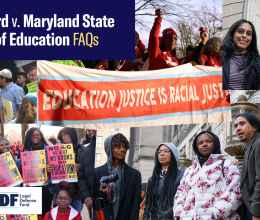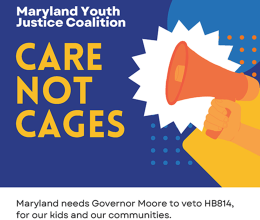
(Photo credit: Brittany Oliver)
One year has passed since the Baltimore Uprising took center stage following the funeral of Freddie Gray, who was killed by the Baltimore City Police Department. There are many truths related to that day.
It’s demonstrably true that Freddie Gray was far from the first Black Marylander killed at the hands of police. In fact, an ACLU briefing paper released more than a month before Freddie Gray was arrested reported that over the previous five years 70% of the 109 Marylanders killed in police encounters were Black. In 2015 alone, there were 21 Marylanders killed in police encounters, nearly half of whom were unarmed. And in a clear sign of racially biased policing, every single unarmed person who died in 2015 in Maryland was Black. Yet, state law enforcement agencies aggressively opposed having to report deaths in police custody. Now, in response to the ACLU report, they must do so under a transparency bill passed in 2015.
It is also certainly true that grassroots groups and leaders in Baltimore had already been organizing before Freddie Gray’s death, part of a wave of locally-focused activism on police reform that has been sweeping the country. Many of those groups had been working in partnership with statewide allies in what would become the Maryland Coalition for Justice and Police Accountability, which includes the ACLU. The coalition’s goal was to achieve the first real reform of Maryland’s Law Enforcement Officer’s Bill of Rights since it was enacted in the 1970s. In early 2015, the first year of the coalition’s legislative effort, Maryland’s elected officials in the General Assembly ignored the demands for justice. But after Freddie Gray was killed, when the demands for justice took over the streets of Baltimore and grassroots leaders pushed even harder and louder than before, elected leaders finally took notice.
Suddenly, Annapolis began to show, or at least feign, interest in addressing real police reform. Legislative leaders convened a workgroup throughout the summer and fall, which released recommendations right before the 2016 legislative session began. Again and again, the Fraternal Order of Police (FOP) flexed its power and was given access and even a seat at the voting table that was not offered to survivors of police brutality, victims’ family members, or members of the communities most affected by racially biased over-policing. But Maryland’s leaders could no longer deny that something had to be done, and the growing coalition continued to demand civilian oversight of police brutality investigations.
By the end of the 2016 session, a bill passed that, for the first time, authorizes local jurisdictions to put voting civilian members on the police hearing boards that determine whether officers can be disciplined for misconduct. And grassroots advocates in Baltimore are already pressing for that change to become a reality. The legislation also created the first statewide requirement that officers prepare use of force reports for every use of force. In addition, the ACLU advocated for the state’s Justice Reinvestment Initiative to live up to its purpose: reducing the number of people in prison and reducing the amount we spend on prisons. One of the reforms eliminates mandatory minimum sentences for some drug distribution offenses. This reform could make a real difference in the lives of Black Marylanders like Freddie Gray, who lose access to employment, education and housing because they are targets in the misguided “war on drugs.”
Yet, we are still faced with the biggest truth of all, which is harder to take on: The underlying violence in Baltimore is systemic. Discriminatory housing, education, policing, transportation and investment policies have all been perpetrated against the same, particularly Black communities in Baltimore for decades. For many years, the ACLU has worked to address these underlying conditions, including segregative housing policies, inadequate education funding, and zero tolerance police practices. We are dedicated to pushing Maryland to recognize and address these kinds of systemic forms of violence perpetrated by the government at all levels.
This week, many ACLU of Maryland staff members attended a conference on “Race, Racism, and Baltimore’s Future,” hosted by Johns Hopkins University. One of the speakers was Sherrilyn Ifill, director of the NAACP Legal Defense Fund, with whom the ACLU has joined in a legal challenge to Governor Larry Hogan’s decision to deny hundreds of millions of dollars in public transportation funding to primarily Black families who live in the east and west sides of Baltimore. During a panel on policing issues, Ifill articulated an important premise of work that needs to be done going forward: While the government cannot fix every problem of structural racism in America, the government created many of the institutional inequalities we see today and it can and should create policies that intentionally do the opposite. The ACLU heartily agrees.
